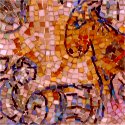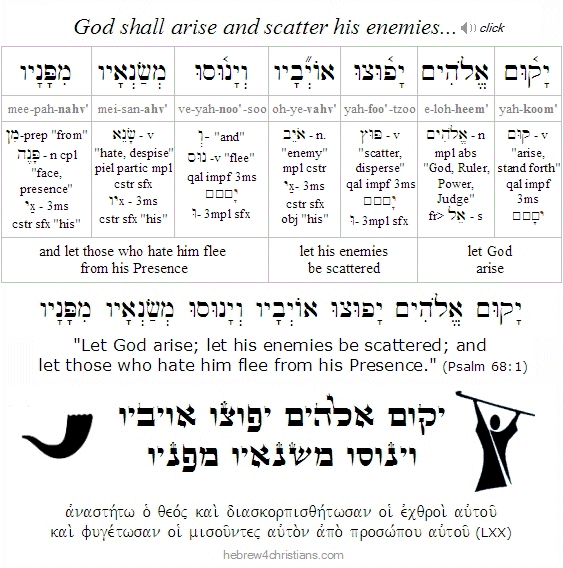|
Balaam was jealous and grandiose, a flamboyant and self-styled "prophet" and interpreter of dreams who used the Divine Name for purposes of sorcery. Inwardly he desired to curse Israel, as is evidenced by his willingness to go along with the evil intent of king Balak. He was a madman who dabbled in the occult and was adept at playing the role of the accuser before the LORD. Ironically, when he accused his donkey of "mocking" him, God opened the mouth of the beast to rebuke him for his perversity of heart. Balaam was a prototype of "Haman" whose malice and jealously ultimately destroyed him.
Balaam was also greedy. Some say that the word Pethor (the place of where he dwelt) comes from the Aramaic word Pethora (פְּתוֹרָה) that means "moneychanger's table." Balaam might have been a "banker" who made loans, and he was enticed by the love of money. It is noteworthy that the Torah states that Balak made his evil appeal to Balaam by sending his messengers with "the fees for divination (קֶסֶם) in their hand" (Num. 22:7). Peter refers to the "way of Balaam" as the love of the wages of unrighteousness (2 Pet. 2:15), and Jude likewise warns us that false teachers will resemble Balaam because they seek the applause of men and offer "instruction" for their own profit (Jude 1:11).
Though he apparently had great potential -- Jewish tradition sometimes describes him as a "pagan counterpart" of Moses himself -- Balaam was ultimately a sorcerer who sought to manipulate God (Josh. 13:22). He often received his "visitations" during the night, calculating the precise time to make his appeal for revelation. Despite originally hearing God say "no" to the plan to curse Israel, Balaam apparently believed he could "change God's mind," and therefore when Balak sent a second set of messengers with a more lucrative offer, we see Balaam questioning God's commandment in the hope of going ahead with the evil mission. Interestingly, despite God's apparent consent to Balaam's second appeal (Num. 22:20), His anger was kindled over his willingness to go, so much so that the Angel of the LORD (מַלְאַךְ יְהוָה) stood in his way as an adversary (שָׂטָן) to him (Num. 22:22). Perhaps God's anger came because His second answer amounted to a test as to whether he would obey God or lust after his own heart's desire (Psalm 81:12). Ironically it was Balaam's donkey who saved his life, despite his mistreatment of her. When Balaam finally saw the Angel with his sword drawn, he fell to the ground prostrate, just as did his donkey...

After being rebuked for the perversity of his way (first by the donkey and then by the Angel), Balaam voiced a word of "repentance," though it was undoubtedly insincere, since he said, "if you are displeased, I will go back," again suggesting that God could change His mind regarding cursing Israel. Initially Balaam's words of repentance may seem to have been sincere, though the entire point of the episode was to let him know that he would be able to speak in a manner similar to his donkey. Indeed, the three times the donkey miraculously saw what Balaam didn't corresponded to the three oracles Balaam saw later. In fact, the donkey foretold of Balaam's mission, and Balak later responded just as Balaam did to his donkey - by smacking his hands together in exasperation (Num. 24:10). Moreover, as soon as the imminent threat of God's judgment had passed, Balaam chose to continue on his way to meet with Balak, knowing full well the king's intentions... When he finally arrived in Moab, he then sought to "bribe" God by means of sacrifices (Num. 23:4), perhaps suggesting that he thought he could still influence God's mind on the subject. Where it is written, "God put a word in his mouth" (Num. 23:5), the idea is that God thrust it into his throat as forcefully as one who drives a nail into a board.
Why did Moses rebuke the Israelites while Balaam blessed them? The sages answer that this demonstrates God's unconditional love for his people. To understand Balaam's inner motives, you can simply reverse the meaning of the blessings he was forced to utter by God. For example, when he said, "How goodly are your tents, O Jacob, your Tabernacle, O Israel," his wicked heart desired the tents to be filled with corruption and Israel devoid of the Divine Presence... God overruled Balaam's evil intent because He loves the Jewish people.
Balaam was not a true prophet but rather a great enemy of Israel. Despite receiving direct revelations from God, the "oracles of blessing" he parroted over Israel were not the result of his free will, since he was little more than a "talking donkey" before the LORD. No, Balaam was utterly perverse within his heart, as evidenced by the wicked advice he later gave to king Balak about how to seduce the Israelites into disobeying God. His perversity is mentioned later in the New Testament: "Balaam, who taught Balak to put a stumbling block before the sons of Israel, that they might eat food sacrificed to idols and practice immorality" (Rev. 2:14). Balaam was later killed in a battle between Israel and the Midianites, when he came to collect his "reward" for the incident at Baal Peor which caused 24,000 Jews to die in the desert (Num. 31:8).
Incidentally, the term "Baal Peor" (בַּעַל פְּעוֹר) refers to an ancient semitic god of the "openings" associated with excrement and exposure… Baal means "lord" and the Hebrew stem (פּער) means "open," used to refer to both the mouth and bowels. Balaam "son of Beor" might mean that he was a prophet of Baal of Peor, and that is why the Torah refers to the sin of the Israelites with the women of Moab - the scheme Balaam later hatched to curse Israel - as "the incident at Baal Peor" (Deut. 4:3).
The irony of Balaam is highly prophetic. It was from Mount Peor, a place of gross idolatry, that God took hold of the false prophet's tongue and made him repeat the promise given to Abraham: "Blessed are those who bless you, and cursed are those who curse you" (Num. 24:9; Gen. 12:3). Such is the fate of all those who attempt to curse the Jewish people. One day every knee will bow before Yeshua, the "Star from Jacob" whose scepter will rule the entire earth (Num. 24:17). Meanwhile we can take comfort that "there is no enchantment against Jacob, no divination against Israel" (Num. 23:23). אֵין עוֹד מִלְבַדּו / ein od milvado: "there is no power apart from Him" - no weapon formed against God's people will prosper.
Hebrew Lesson
Psalm 68:1 reading (click):
Note: There is some question as to who was worse - king Balak or the false prophet Balaam... King Balak was a superstitious pagan who believed in the power of magic. In light of his fear that Israel was an "ox" who would lick up the grass of the field (a symbol of pagan deity), he decided to ally himself with the princes of Midian, who knew Jethro, Moses' father-in-law. This was a shrewd political move on Balak's part. These Midian princes told Balak that Moses' power came by invoking the Name of the LORD (שֵׁם יְהוָה), and therefore he needed to enlist the services of Balaam, a distant relative of Israel (from Aram) who understood the the Divine Name and could use it to spiritually confound the Israelites. Balaam, on the other hand, was a little more than a sorcerer whose motive was based more on personal malice than politics, as evidenced by his abuse of the Divine Name as a means of bringing harm to God's people (Josh. 13:22). Indeed, Balaam represented Israel's last peril east of the Jordan River, and therefore his schemes represent Satan's last attempt to thwart Israel's possession of the Promised Land. Perhaps it is a moot point to ask which of the two was more wicked, since both sought to undermine the purposes of the LORD God of Israel. However, the story of Balaam is a warning that those who attempt to manipulate God by invoking His Name for evil ends will surely share his fate...
|




